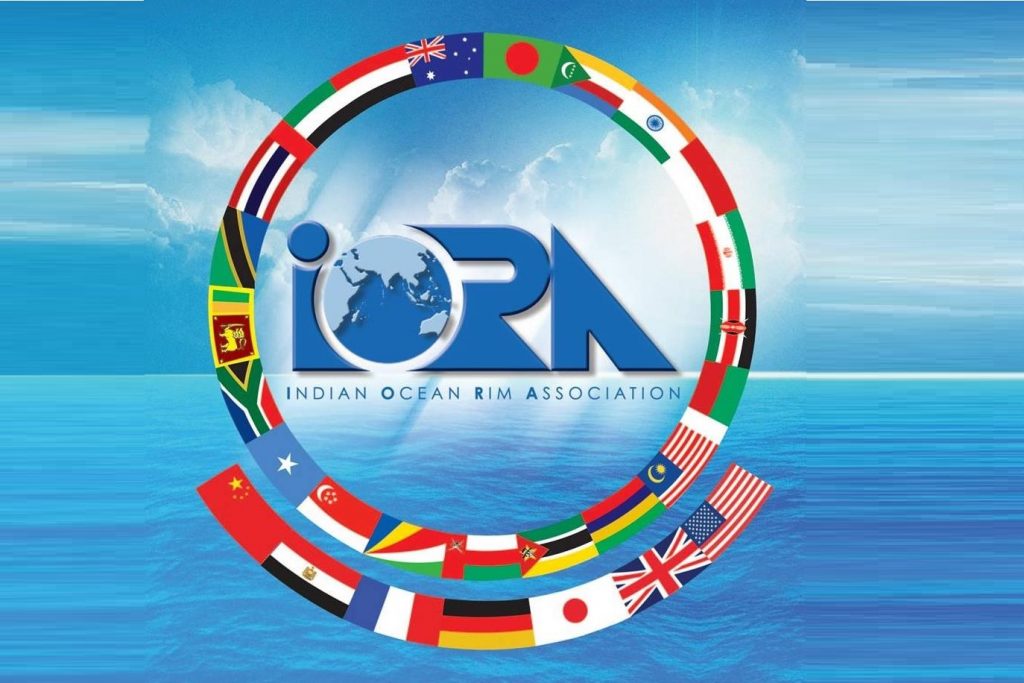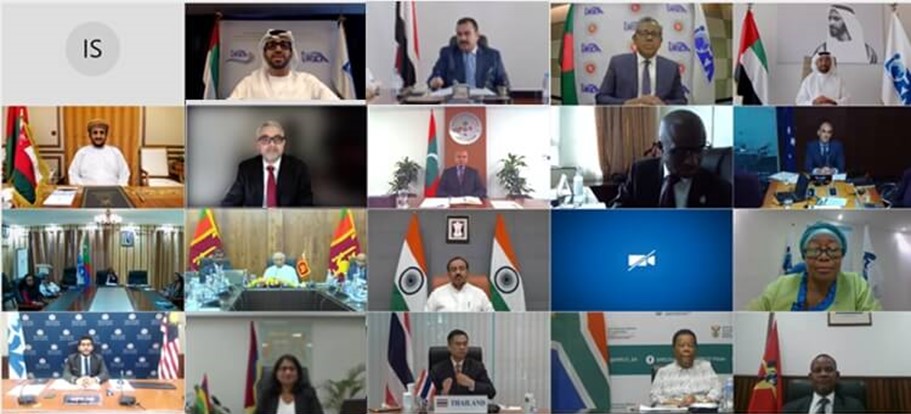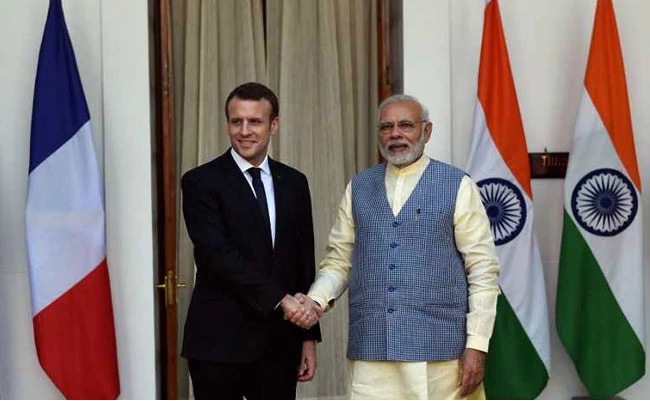- The Indian Ocean region has become crucial to world politics and much of the international power play will pan out in the region
- With the addition of France to Indian Ocean Rim Association (IORA), it now has 23 member states and 9 dialogue partners including USA, China, Germany, and others.
- IORA seeks to serve as ‘the first line of defence’ against piracy, terrorism, trafficking, even climate change.
- Around ninety per cent of France’s Exclusive Economic Zone lies in the Indian Ocean Region, and 1.5 million French citizens reside on Indian Ocean islands.
- France has enhanced strategic cooperation with India over the last few years in the Indian Ocean as India becomes more comfortable at being pro-active in its foreign policy and more open to partnerships in Indian Ocean.
- The growing footprints of China in the Indian Ocean is making all major players uneasy because Beijing has demonstrated its unwillingness to play by the rules.
- France clearly states that Indo-Pacific region is a priority area and emphasizes the country’s identity as an Indian Ocean Region state.

The French Republic became a member of the Indian Ocean Rim Association (IORA) this December. As the name suggests, IORA is an intergovernmental organization of countries around the Indian Ocean, with Pakistan being a major exception. The French membership has been approved on account of Reunion Island, an overseas territory of France in the Indian Ocean. France had first joined IORA in 2001 as dialogue partner. With UAE as IORA’s current Chair, Russia and Saudi Arabia were denied its dialogue membership.
It is obvious that the Indian Ocean region has become crucial to world politics and much of the international power play will pan out here. This is also demonstrated in the increasing stress on ‘Indo-Pacific’ by USA recently. Given India’s centrality in the region, surely more and more international affairs will call for Indian involvement, and New Delhi is gearing up to utilize this changing scenario.
IORA
The idea of an association of Indian Ocean countries was initiated by South Africa and India in the 1990s with the vision of fostering socio-economic cooperation in an area of geographic common sense. With the latest addition, it now has 23 member states and 9 dialogue partners including USA, China, Germany, and others. IORA’s stated aim includes strengthening regional cooperation and sustainable development in the Indian Ocean Region.
While being its Chair from 2011 to 2013 India reinvigorated the association by chalking out its 6 priority areas- maritime safety and security, trade and investment facilitation, fisheries management, disaster risk management, tourism & cultural exchanges, and academic, science & technology- and 2 focus areas- blue economy and women’s economic empowerment. The careful choosing of the priority areas speaks volumes about what India along with the other member states envisions IORA to grow into.

First, from Africa to Australia, IORA seeks to serve as ‘the first line of defence’ against piracy, terrorism, trafficking, even climate change. Given that almost 80 per cent of world’s sea trade and very importantly, two-third of the world oil trade passes through this ocean, guaranteeing safe transit is the most vital step towards making IORA the predominant association of the Indian Ocean Region. It is important to note here that the association’s understanding of maritime security also includes international peace, territorial sovereignty, and political independence.
Second, Indian ocean is at the heart of world trade, with key choke points like Strait of Malacca, Strait of Hormuz and others which makes it an area of interest for everybody. Additionally, developed countries like France are aware of the demographic dividend of the Indian Ocean rim countries and so, are investing efforts in the region for future returns. India is the fifth largest economy in the world with more than 65 per cent of its population below the age of 35. As per a UNICEF report, the working age population (15-64 years) in Eastern and Southern Africa will be around 600 million by 2047. IORA’s focus on promoting sustained growth and balanced development in the region through flagship projects like IORA Sustainable Development Program, Somalia and Yemen Development Program, etc can ensure that the region becomes the powerhouse of world economy in the coming decades.
Third, developing research and technology is a focus area for IORA. In this century, for any region to develop itself into a coherent, economically vibrant and secure block, technological research and knowledge creation & sharing is indispensable. Academic cooperation has the capacity to strengthen societal bonds as well as streamline the members’ vision for the future of the region and the association’s role in it. Concentration and cooperation in this focus area can have long term impacts on the region’s security, prosperity, disaster management & mitigation, and fight against climate change. IORA’s cooperation with other alliances like International Solar Alliance, IRENA etc in a meaningful manner will help it in making substantial contributions to sustainable development and environmental protection. Climate change is a highly relevant issue for the IORA member states, especially island nations like Maldives, Seychelles, etc whose very existence is threatened by global warming induced rise in sea levels. Environmental disruptions have a direct impact on well-being of the countries who depend heavily on maritime sources. IORA has displayed keen far-sightedness in choosing blue economy as a focus area.
Fourth, the politics of ‘Indo-Pacific’. As per observers, the idea of ‘Asia-Pacific’ is quickly getting replaced by ‘Indo-Pacific’- an idea first put forth by Australia and brought into currency by Japan’s PM Shinzo Abe. USA identified Indo-Pacific as the new theatre in its strategy in 2017. It even renamed the US Pacific Command to Indo-Pacific Command. France officially considers Indo-Pacific region as central to a stable, multi-polar world. India’s External Affairs Minister has stated that Indo-Pacific is not tomorrow’s forecast but yesterday’s reality. Interestingly, Russia is not comfortable with the idea of Indo-Pacific.
The exclusion of Pakistan from IORA is not a happy coincidence. Decision-making in IORA is based on consensus. It is common knowledge that Pakistan’s major agenda in international forums is opposing India, so much so that a potentially highly relevant organization like SAARC was rendered redundant. This showcases the willingness of the members to take firm decisions through consensus, and make IORA the chief international forum of the region.
France and India in Indian Ocean Region

Around ninety per cent of France’s Exclusive Economic Zone lies in the Indian Ocean Region, and 1.5 million French citizens reside on Indian Ocean islands. So, France’s interest in the region is obvious. What’s notable about France gaining IORA’s membership is that this happened despite several hurdles. Other than facing the stigma of being an erstwhile colonizer, France has territorial disputes with Madagascar over Glorioso Island, and with Comoros over Mayotte. Its membership was cleared to have been accepted only on account of Reunion Island. Iran had also objected to France’s membership. Tehran’s withdrawal of objection can be read as an attempt towards creating space for restoring the nuclear agreement of which France is a party, now that American leadership is set to change.
France has enhanced strategic cooperation with India over the last few years in the Indian Ocean as India becomes more comfortable at being pro-active in its foreign policy and more open to partnerships in Indian Ocean. Maritime security has become a focus issue in the countries’ bilateral relations. Indian Space Research Organization (ISRO) and France’s National Centre for Space Studies (CNES) have signed MoU for developing maritime surveillance satellite system for the Indian Ocean. The Agreement for the Provision of Reciprocal Logistics Support between the Armed Forces of the two nations was inked in 2018. India had backed France’s membership in IORA, and France had supported India’s bid to enter the Indian Ocean Commission. It even backed India in the UN on the issue of Jammu Kashmir in 2019. The largest ever bilateral naval exercise between India and France ‘Varuna’ was held in 2019 at Goa. Both the nations have common interest in keeping these waters free of conflicts that changing international power dynamics will eventually cause.
India in the Indian Ocean- opportunities abound
The growing footprints of China in the Indian Ocean is making all major players uneasy because Beijing has demonstrated its unwillingness to play by the rules. For instance, it refused to accept the Permanent Court of Arbitration’s judgement in South China Sea dispute with Philippines; it operates world’s largest DWF (Distant Water Fishing) fleet and is the largest perpetrator of IUU fishing- illegal, unreported and unregulated fishing. This particularly creates socio-economic hardships for the vulnerable communities which depend largely on fishing to survive. China has used debt trap diplomacy in the name of the Maritime Silk Road (MSR) of the much-hyped Belt and Road Initiative (BRI) to gain foothold in the Indian Ocean, notably in Sri Lanka and Djibouti. The developed world (read USA and allies) is particularly concerned with securing underwater cables and SLOCs (sea lines of communication).
However, as China itself has grudgingly accepted, India has the predominant geographical advantage in the Indian Ocean. As the tone of Indian foreign policy is changing to become more active and assertive, New Delhi is taking measures to secure Indian Ocean as its area of influence. Bilateral naval exercises like Indra with Russia and Konkan with UK, and multilateral ones like the Malabar exercise and Milan exercise are attempts to project India’s capacity as the primary security provider in the region. Covid-19 relief mission, SAGAR (Security And Growth for All in the Region) policy doctrine put forth by the Indian PM in 2015, or IPOI (Indo-Pacific Oceans Initiative) to work with countries like Japan and Australia for maintaining maritime peace and security exhibit India’s mature understanding of the international scenario.
Making IORA more effective is another step in the direction. IORA is a highly effective platform for India to establish itself as the power nucleus in Indian Ocean Region. It can be utilized to set narratives in regional and world politics, leverage the Dialogue partners with strategic interests in the region, and secure sustainable prosperity for all in the region. New Delhi is demonstrating a willingness to shed off its characteristic fence-sitting policy and assume a greater role in international affairs.
France is the first European country to make significant moves in light of the changing theatres of world politics. Its Ministry for Europe and Foreign Affairs clearly states that Indo-Pacific region is a priority area for France, and emphasizes the country’s identity as an Indian Ocean Region state. France has military presence in Abu Dhabi and Djibouti. It is the first non-neighbour country that India has conducted CORPAT with, something even the US has been denied.
French Navy Chief Admiral Prazuk had expressed concern over increased presence of Chinese fleet in the region on pretext of piracy issues. Membership of the IORA will enhance its involvement in the region. It will further France’s stated aim of maintaining stability and inclusivity in the region. On the other hand, IORA will gain international weight with inclusion of France as it is a permanent member of the UN Security Council. France is a major economic power with one of the largest navies in the world. And unlike USA it is not engaged in open conflict with China, which makes its inclusion diplomatically easy for all members to accept. As for India, this will augment its blooming strategic relationship with France and enhance its position as major power in Indian Ocean Region.
(Author is a political science research scholar)
Political Science research scholar
